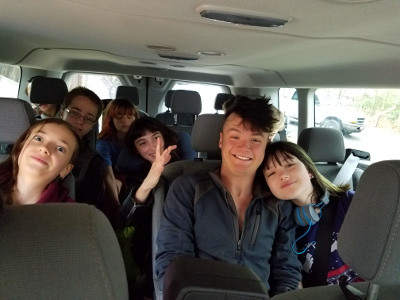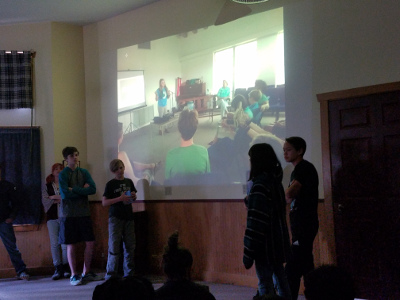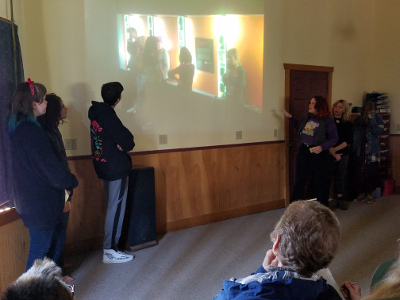Learning through Storytelling

Every year when our 18 Day Field Trips return home, students share their experiences with their peers, parents, teachers, and community members. Trip sharing is a community event to which all of Celo is invited. It is an opportunity for students to proudly present what they learned while traveling. It also gives them the opportunity to process their adventure by thinking the larger context of their experiences. It’s learning through storytelling!
With a plethora of videos and photos from the trip, students describe each activity they did and what it meant to them. They paint a fun picture of life on the road by telling humorous stories and explain the ways they were surprised by the people and places they visited.
In Their Words
 Joseph, a ninth grader describes his trip this year!
Joseph, a ninth grader describes his trip this year!
“I was on the Climate Change and Coastal Ecology trip. When I started the class, i thought that global warming was happening slowly and that we weren’t already hurting from the effects of pollution. By the end of the class, I had a faint idea of how serious the damage was, but still wasn’t aware that 50% of the world is in danger because they live on a coastline. I learned that from my trip. After talking to many concerned scientists that expressed to us that climate change is real, I now understand that it a very pressing matter.
“We spoke to Delaney Reynolds, a college student who created a non-profit organization called the Sink or Swim Project. Delaney works to get more money designated for climate change research in Miami Dade County. She is trying to change the practices in Miami regarding climate change. Delaney was very inspiring because she’s already made a huge impact on the world. She started on this huge project when she was only in ninth grade and continues it today.
“My experiences on 18 Days are unforgettable. From Jacksonville to Miami to the Keys, I was in awe of every cool thing we saw. I was constantly swiveling my head from window to window while we drove from Miami to Boynton Beach to Gainesville. As I return home, I am relishing at the amazing times we had as a group, even at the little fun things we did like all going to a board game cafe or playing in the park. It was an incredible trip!”
Audience Participation
 At the end of their description, audience members are invited to ask questions about their experience. Sometimes the questions are clarifications about activities the group described, but occasionally the questions probe a little deeper. On audience member asked the Civil Rights trip whether the trip impacted their plans for the future. Ursula, a seventh grader answered that she is now inspired to go into social justice as a career.
At the end of their description, audience members are invited to ask questions about their experience. Sometimes the questions are clarifications about activities the group described, but occasionally the questions probe a little deeper. On audience member asked the Civil Rights trip whether the trip impacted their plans for the future. Ursula, a seventh grader answered that she is now inspired to go into social justice as a career.
Another question asked the group about their understanding of racism. Autumn, a ninth grader, reflected that the trip helped him see racism as a systemic problem. “No matter how aware you think you are, you are still affected by racist thoughts because the culture influences you,” he stated.
Trip sharing is a way for students to explain what they learned from the trip in their own words. By telling stories of their experiences to an audience, they gain context and perspective while also informing others about important topics. They can feel proud of their experience and about what they learned.
-by Nicholas Maldonado
